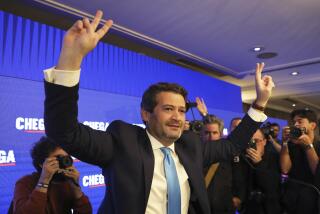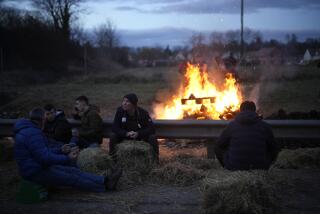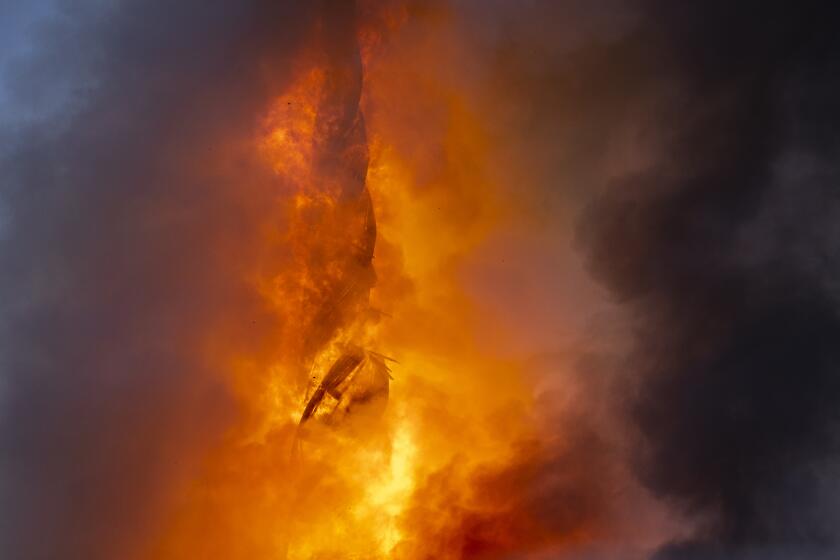French village embraces an extremist
BRACHAY, France — The drive to this picturesque village nearly 200 miles southeast of Paris winds through forests and farmland where hawks stand guard on roadside fence posts and egrets glide across empty pastures. With a population of just 60, Brachay’s residents say they are “the forgotten ones.”
One person did remember them: Marine Le Pen, leader of the far-right National Front party. The town thanked her with a record 72% vote in her favor during the first round of France’s presidential election last Sunday.
That day, Le Pen, 43, surprised the country by placing a strong third behind the two front-runners, President Nicolas Sarkozy and his Socialist challenger, Francois Hollande. Her 18% of the vote transformed the leader of the anti-immigrant nationalist party from an electoral also-ran into a key player in the runoff May 6.
With Sarkozy trailing in polls that give Hollande a lead of as much as 10 percentage points, the incumbent desperately needs to woo Le Pen’s supporters to save his political career. Consequently, the National Front’s pet themes — immigration, security and national identity among them — have shot to the top of the election agenda.
Le Pen has been keeping everyone guessing as to how she will advise her supporters to vote, if at all. She is expected to use the party’s traditional May Day rally around the statue of Joan of Arc in central Paris to say something about the race, though what she will say is hard to guess.
Le Pen has little interest in keeping Sarkozy, whom she detests, in power, and hopes that if he loses his right-of-center Union for a Popular Movement party will implode. With the National Front looking to pick up seats in parliamentary elections in June, the party aims to position itself as a credible opposition. But there is no love lost between Le Pen and Hollande either.
In Brachay, where stone cottages are clustered around a steepled church, a well-groomed central square and a large National Front poster, villagers were thrilled when Le Pen visited in early April. Suddenly they were not forgotten, but part of something much bigger.
“What surprised me,” said Mayor Gerard Marchand, 54, “was how excited people were to meet her. Do you remember the Beatles?”
His wife, Brigitte, added, “Nobody believed Marine Le Pen would come out to this little village. They laughed and said: ‘What are we? Nothing at all.... You think she’ll come to a village of 60 people?’”
But Le Pen did come, attracting neighboring villagers and winning over new admirers with what the mayor described as her accessible style and willingness to “get off her podium and talk to everyone.”
Though they have little local contact with members of France’s immigrant population, the Marchands, like other villagers, are fearful of the “foreigners” they believe are overrunning the country and straining France’s generous social model.
The strength of the National Front vote has enabled the couple to shrug off accusations that they are xenophobic and voice that fear in terms that were previously taboo.
Immigrants “are a problem; they are becoming more and more numerous,” Gerard Marchand said. “Foreigners have seven to eight kids. We have two. In 200 years, who’ll be in whose home?”
Most villagers in Brachay struggle to make ends meet on about $1,300 a month, on average. “It’s true, we are the forgotten ones,” the mayor said.
The couple say they admire Le Pen because she fights for “a France for the French.”
France’s slide to the right is nothing new in Europe. With the continent paralyzed by economic woes, politicians have increasingly played a populist tune, often blaming foreigners for their troubles.
European Union President Herman Van Rompuy has criticized what he calls the “winds of populism” blowing across Europe, fanned by “extremist movements.”
The Netherlands is heading toward a general election in September with Geert Wilders, leader of the anti-immigrant, anti-Islam Freedom Party, in third place and rising.
Farther south, debt-strapped Greece is witnessing the rise of the Golden Dawn ultranationalist movement. The party, which had been on the fringe of the political fringes, boasts a red-and-black flag bearing an ancient Greek symbol that resembles a swastika. Fueled by public fury over the nation’s austerity measures, the party is expected to win seats in parliamentary elections May 6.
A recent report by Amnesty International identified widespread prejudice in Europe. The human rights group said political leaders, rather than combating fear of Islamic extremism, have been pandering to prejudice against Muslims in a quest for votes.
Critics of Sarkozy’s efforts to court the far right in France would agree.
“The end does not justify the means,” Le Monde newspaper warned in a front-page editorial. It accused the outgoing president of a “moral fault” in adopting the “language, the rhetoric … the ideas and obsessions of Madame Le Pen.”
In Brachay, however, villagers such as the Marchands are unrepentant. Most say they will vote for Sarkozy in the next round and hope the National Front will make a strong showing in the legislative elections that follow.
The mayor and his wife are angry that they and their neighbors have been ridiculed and denigrated by France’s news media.
“There are a lot more of us than they thought,” he said.
“They might have just reinforced us by insulting us so much,” his wife said. “We also received lots of phone calls of support. They said, ‘Bravo!’”
Special correspondent Lauter reported from Brachay and special correspondent Willsher from Paris.
More to Read
Start your day right
Sign up for Essential California for news, features and recommendations from the L.A. Times and beyond in your inbox six days a week.
You may occasionally receive promotional content from the Los Angeles Times.






